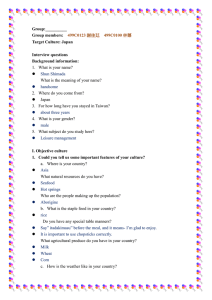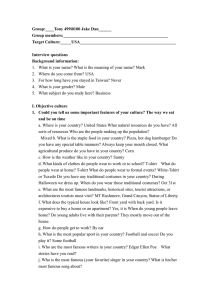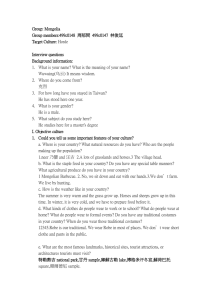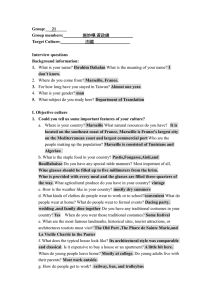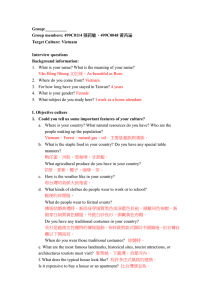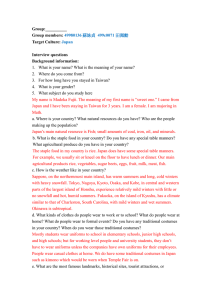Group: Group members: Target Culture:
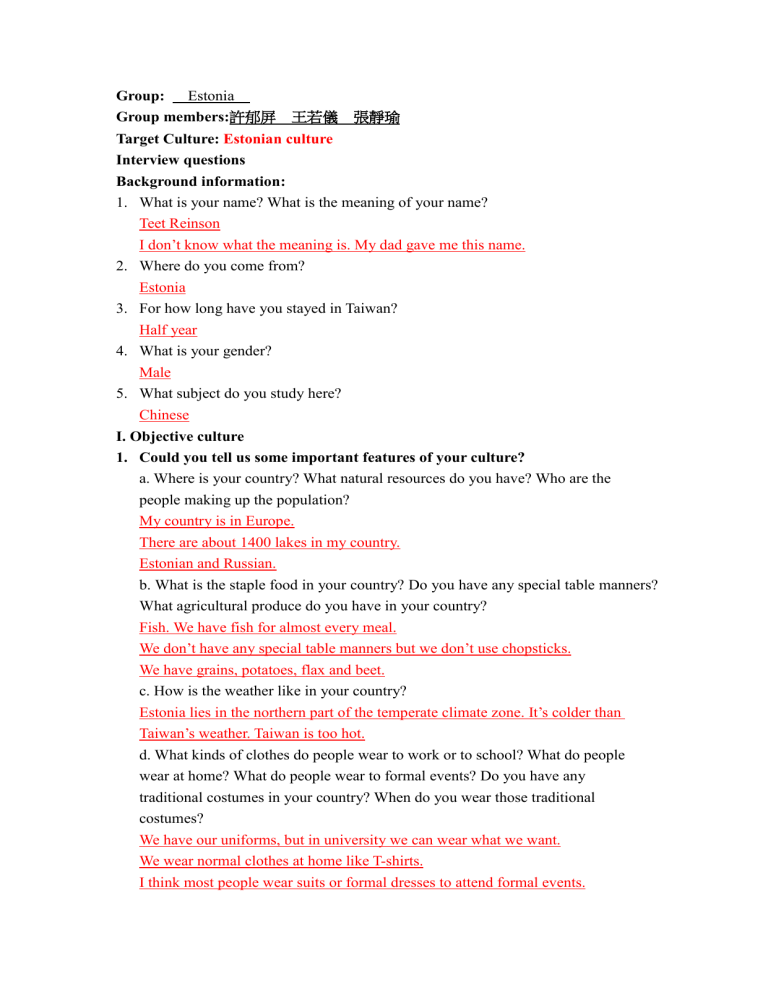
Group: Estonia
Group members: 許郁屏 王若儀 張靜瑜
Target Culture: Estonian culture
Interview questions
Background information:
1.
What is your name? What is the meaning of your name?
Teet Reinson
I don’t know what the meaning is. My dad gave me this name.
2.
Where do you come from?
Estonia
3.
For how long have you stayed in Taiwan?
Half year
4.
What is your gender?
Male
5.
What subject do you study here?
Chinese
I. Objective culture
1.
Could you tell us some important features of your culture? a. Where is your country? What natural resources do you have? Who are the people making up the population?
My country is in Europe.
There are about 1400 lakes in my country.
Estonian and Russian.
b. What is the staple food in your country? Do you have any special table manners?
What agricultural produce do you have in your country?
Fish. We have fish for almost every meal.
We don’t have any special table manners but we don’t use chopsticks.
We have grains, potatoes, flax and beet. c. How is the weather like in your country?
Estonia lies in the northern part of the temperate climate zone. It’s colder than
Taiwan’s weather. Taiwan is too hot.
d. What kinds of clothes do people wear to work or to school? What do people wear at home? What do people wear to formal events? Do you have any traditional costumes in your country? When do you wear those traditional costumes?
We have our uniforms, but in university we can wear what we want.
We wear normal clothes at home like T-shirts.
I think most people wear suits or formal dresses to attend formal events.
We seldom wear traditional costumes but there are many waitress wear traditional costumes to attract customers. e. What are the most famous landmarks, historical sites, tourist attractions, or architectures tourists must visit?
Tallinn Pikk-Historic, Centre (Old Town) of Tallinn f. What does the typical house look like? Is it expensive to buy a house or an apartment? When do young people leave home? Do young adults live with their parents?
Like churches in Taiwan.
Very expensive.
After 16
There are some adults live with their parents.
g. How do people get to work?
Bus and trolly bus h. What is the most popular sport in your country? Do you play it?
Soccer, seldom. I prefer pool. i. Who are the most famous writers in your country? What stories have you read?
Tonu Onnepalu
Piiririik j. Who is the most famous (your favorite) singer in your country? What is his/her most famous song about?
Kerli
Walking on air
2. Regarding the items mentioned in question 1, what differences do you find between your culture and Taiwanese culture?
Building. Because I majored Architecture in Estonia, the buildings in Taiwan are very different to ours.
II. Subjective Culture
1. Could you tell us the subjective feature of your culture? a.
Time: Is it important to be punctual? Do people always arrive on time? Is it ok to arrive late?
Yes!
To be punctual is the basic manner so people always arrive on time.
If it’s not too long, it’s ok. b.
Invitation: Is it normal to invite a friend to have dinner at home? Or people meet in the public places, like restaurants or cafés? Do you need to bring something if you are invited?
Yes, we like to have party at home.
We also like to meet outside!
Seldom. The host always prepares all the things. c.
Greeting: How do people greet each other when they meet? Do you shake hands, bow, hug, or kiss? What do you say to each other?
Shake hands or smile.
Yes, kuidas käsi käib? how are you?
d.
Agreement and disagreement: How do you express agreement or disagreement?
Acceptance or refusal?
Just say no. It’s different from person to person. e.
Directness: Is it polite to be direct? Or do people tend to be indirect?
It’s not a matter of politeness I think. We tend to be direct.
f.
Do people use body language a lot? Is it polite to touch someone while speaking?
We always talk with body language. It’s not impolite at all. g.
Are there any taboos foreigners must know before visiting your countries? What do you think are the underlying reasons of those taboos?
No, there isn’t any taboo in our country I think.
2.
Regarding the items mentioned in question 2, what differences do you find between your culture and Taiwanese culture?
Invitation and Directness.
Taiwanese seldom invite us to their home but in Estonia we always do so.
We tend to be direct and I think it’s not about the politeness.
訪談後之心得感想 :
1.
我覺得這個訪談活動有何優點 ?
讓我們了解到愛沙尼亞的文化,讓我們更加深入了解這個國家。
2.
我學到什麼新的文化知識 ?
其實愛沙尼亞跟台灣一樣都是一個民主國家,而他們人民也很愛好自由與獨
立。
3.
我學到什麼新的語言或單字 ?
愛沙尼亞語,可是很難,他們還精通其他歐洲語言。
4.
我在和外籍學生中運用什麼溝通技巧來理解和表達 ?
肢體語言是很重要的,在溝通不良時,用肢體動作會讓他們更加了解我們所
想表達的。
5.
我覺得訪談活動有什麼缺點 ?
愛沙尼亞人太難找了
6.
我在尋找國際學生訪談的過程是否有任何困難 ?
很少遇到外籍生於是得去打聽他們上課時間與出沒地點
Group: ___ Japan__ _
Group members:__ 王若儀 許郁屏 張靜瑜 __ ____
Target Culture: __ __Japanese Culture__ __
Interview questions
Background information:
6.
What is your name? What is the meaning of your name?
北谷淳史 nature and pure
7.
Where do you come from?
Japan
8.
For how long have you stayed in Taiwan?
For about two years
9.
What is your gender? male
10.
What subject do you study here?
Chinese
I. Objective culture
3.
Could you tell us some important features of your culture? a.
Where is your country? What natural resources do you have? Who are the people making up the population?
Japan(Tokyo) an island in the east of Asia
Tokyo Bay
Local people and some of them are from all over Japan b.
What is the staple food in your country? Do you have any special table manners? What agricultural produce do you have in your country?
Sushi
The most important table etiquette in Japan is saying traditional phrases before and after a meal. Japanese people say, "Itadaki-masu" before a meal and say
"Gochisou-sama" after a meal. crop c.
How is the weather like in your country?
There are four seasons in all. d.
What kinds of clothes do people wear to work or to school? What do people wear at home? What do people wear to formal events? Do you have any traditional costumes in your country? When do you wear those traditional costumes?
Kimino and bathrobe
Casual clothes
Birthday and festivals
Yes!!!!Of course e.
What are the most famous landmarks, historical sites, tourist attractions, or architectures tourists must visit?
Tokyo Tower and Tokyo Disney Land f.
What does the typical house look like? Is it expensive to buy a house or an apartment? When do young people leave home? Do young adults live with their parents?
Palace in the past
Yes
After eighteen
Not exactly g.
How do people get to work?
MRT, cars and bikes h.
What is the most popular sport in your country? Do you play it?
Soccer
Not at all i.
Who are the most famous writers in your country? What stories have you read?
島田雅彥
Some short stories in the cellphone.( 徒然王子 ) j.
Who is the most famous (your favorite) singer in your) country? What is his/her most famous song about?
AKB48 River
2. Regarding the items mentioned in question 1, what differences do you find between your culture and Taiwanese culture?
Table manners
II. Subjective Culture
1. Could you tell us the subjective feature of your culture? h.
Time: Is it important to be punctual? Do people always arrive on time? Is it ok to arrive late?
Yes!!!!!!
Of course!!!!!!
Not good!!!!!!
Invitation: Is it normal to invite a friend to have dinner at home? Or people meet in the public places, like restaurants or cafés? Do you need to bring something if you are invited?
Yes!!!It’s very common. Some representative gifts.
i.
Greeting: How do people greet each other when they meet? Do you shake hands, bow, hug, or kiss? What do you say to each other?
Bow
Bow or shake hands.
Good morning. Good afternoon. Good evening. Hello. j.
Agreement and disagreement: How do you express agreement or disagreement?
Acceptance or refusal?
Say Yes or No and with some signatures. k.
Directness: Is it polite to be direct? Or do people tend to be indirect?
It’s really impolite to express your meaning directly without some polite words. l.
Do people use body language a lot? Is it polite to touch someone while speaking?
Yes!!!
It’s really impolite. m.
Are there any taboos foreigners must know before visiting your countries? What do you think are the underlying reasons of those taboos?
Politeness is very important.
2. Regarding the items mentioned in question 2, what differences do you find between your culture and Taiwanese culture?
They would bow while meeting.
III. 就你自己的經驗,對這個訪談活動有何心得感想 :
7.
我覺得這個訪談活動有何優點 ?
讓我們了解到日本文化其實跟我們的刻板印象是不太一樣的
8.
我學到什麼新的文化知識 ?
禮貌是很重要的
9.
我學到什麼新的語言或單字 ?
早安 午安 晚安 你好
10.
我在和外籍學生中運用什麼溝通技巧來理解和表達 ?
由於日本人有很重的腔調所以有時候無法完全了解對方意思於是我們常會用
肢體語言來表達
11.
我覺得訪談活動有什麼缺點 ?
很難找到外籍生而且問題太多占用他們太多時間
12.
我在尋找國際學生訪談的過程是否有任何困難 ?
溝通很困難
